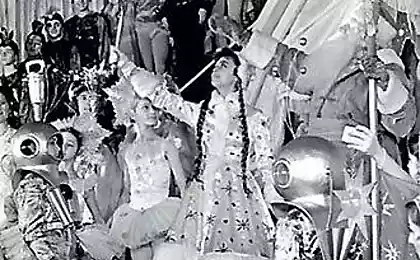171
Money on the savings book was a great idea, which was not destined to be realized, as I now remember that disappointment.
A person tends to think about his future and care about the well-being of his family. The poorer he lives, the more serious he takes this issue and tries to postpone it for a rainy day. Since in the Soviet Union citizens lived mainly on a beggar's salary, they had to constantly save and save to buy a worthwhile thing in the house or treat themselves to new clothes. Money on the savings book gave ordinary people weak confidence in the future. Let's get it together and we're great!

Money on a savings book is a great idea, which, unfortunately, was not destined to be realized. Since the funds on it were more difficult to spend, ordinary Soviet workers were able to save enough money for studying, for example, or for a wedding. Only a select few could dream about a personal car then, so units were collected on the "Moskvich" or "Zhiguli".
But many parents tried to provide children with start-up capital and put part of the salary into a savings account until the child is of age. In some enterprises, by prior agreement with accounting, a certain amount was automatically transferred from employees' salaries to their personal savings accounts. Investors did not have to go anywhere. Simple and convenient.

There was no extra money on the savings book. To postpone them, most citizens of the Soviet Union had to limit themselves in many ways. When did they really want to live? New things, rest and entertainment - everything was postponed for later. At that time, only party workers, directors, heads, chairmen and the like did not deny themselves anything. They made more money, had substantial savings on their books, and suffered along with others, but this was not a tragedy for them, unlike the workers or peasants.

Remember the scene from Leonid Gaidai’s film Ivan Vasilyevich Changes Profession, where a robber voices a line that later became winged: “Citizens, keep money in the savings bank, if, of course, you have them!”? The thief then found in the apartment at the dentist not only paper bills, but also government bonds (as it turned out, another way to dilute the money of ordinary citizens).

If the well-to-do representatives of society could carelessly hide cash houses, then ordinary people kept money on a savings book so that their “blood” did not disappear. Irony of fate! This is not about the comedy of Eldar Ryazanov, but about the fact that at one point these savings depreciated for everyone who did not have time to use them before the collapse of the USSR.
As a result of the financial reform of 1991, all deposits of Soviet citizens were frozen. Their total amount was 220 million rubles. Money on the savings book turned into meaningless records: before they could buy a car, an apartment or household appliances, and now it is only a dream. Everything collapsed. The accumulated funds melted like a mirage and caused heart attacks in citizens with a weak heart.

When the government promised to reimburse the people, people lined up for miles in the hope of getting theirs back. Soon, the deceived depositors learned the amount of compensation, and the joy was replaced by bitter disappointment.
Many even changed their minds to get a rare document from the nightstand. I am one of them. At first, I wanted to withdraw at least some amount from the old account, but my intentions changed dramatically when I heard about the miser that is now being charged.

Did you happen to have a gray savings book from the Soviet era? What do you plan to do with her?

Money on a savings book is a great idea, which, unfortunately, was not destined to be realized. Since the funds on it were more difficult to spend, ordinary Soviet workers were able to save enough money for studying, for example, or for a wedding. Only a select few could dream about a personal car then, so units were collected on the "Moskvich" or "Zhiguli".
But many parents tried to provide children with start-up capital and put part of the salary into a savings account until the child is of age. In some enterprises, by prior agreement with accounting, a certain amount was automatically transferred from employees' salaries to their personal savings accounts. Investors did not have to go anywhere. Simple and convenient.

There was no extra money on the savings book. To postpone them, most citizens of the Soviet Union had to limit themselves in many ways. When did they really want to live? New things, rest and entertainment - everything was postponed for later. At that time, only party workers, directors, heads, chairmen and the like did not deny themselves anything. They made more money, had substantial savings on their books, and suffered along with others, but this was not a tragedy for them, unlike the workers or peasants.

Remember the scene from Leonid Gaidai’s film Ivan Vasilyevich Changes Profession, where a robber voices a line that later became winged: “Citizens, keep money in the savings bank, if, of course, you have them!”? The thief then found in the apartment at the dentist not only paper bills, but also government bonds (as it turned out, another way to dilute the money of ordinary citizens).

If the well-to-do representatives of society could carelessly hide cash houses, then ordinary people kept money on a savings book so that their “blood” did not disappear. Irony of fate! This is not about the comedy of Eldar Ryazanov, but about the fact that at one point these savings depreciated for everyone who did not have time to use them before the collapse of the USSR.
As a result of the financial reform of 1991, all deposits of Soviet citizens were frozen. Their total amount was 220 million rubles. Money on the savings book turned into meaningless records: before they could buy a car, an apartment or household appliances, and now it is only a dream. Everything collapsed. The accumulated funds melted like a mirage and caused heart attacks in citizens with a weak heart.

When the government promised to reimburse the people, people lined up for miles in the hope of getting theirs back. Soon, the deceived depositors learned the amount of compensation, and the joy was replaced by bitter disappointment.
Many even changed their minds to get a rare document from the nightstand. I am one of them. At first, I wanted to withdraw at least some amount from the old account, but my intentions changed dramatically when I heard about the miser that is now being charged.

Did you happen to have a gray savings book from the Soviet era? What do you plan to do with her?
Reflections on what makes women cook for men on a regular basis
How to germinate potatoes to get an early and very generous harvest, start cooking now























